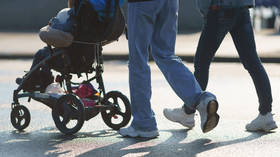Moscow university pitches higher taxes for the ‘childless’

The Russian State Social University (RSSU) has outlined a draft framework for a tax on childless citizens, according to a senior official at the institution. The proposal to revive a Soviet-era tax on people without children has met with mixed reviews from lawmakers, however.
In an interview with the Govorit Moskva radio station, RSSU’s first vice-rector, Dzhomart Aliev, said that among the options being explored is a childless tax, which could potentially help deliver population growth. He said that the initiative would entail a 3% hike to a childless person’s income tax, while inheritance tax and property tax would be boosted by 5% and 0.5%, respectively.
Earlier this week, Lieutenant General Andrey Gurulev, a member of the State Duma Defense Committee, also suggested that the Russian authorities should revive a Soviet-era policy of taxing people who don’t have children. The lawmaker said that the money raised from the measure could be used to modernize orphanages in Russia.
The so-called tax on childlessness was in effect in the USSR from 1941 to 1992. It applied to childless men from the ages of 20 to 50 and childless women from 20 to 45. The tax rate varied around 6%, depending on income.
However, Gurulev’s proposal sparked a backlash among some lawmakers. The suggestion was slammed by Nina Ostanina, head of the Committee of the State Duma on Family Protection, who pointed out that the Soviet-era policy also included mandatory social guarantees, free nurseries, free kindergarten, free school, free vacations for children, free university and a free apartment. Meanwhile, Russian State Duma MP Yevgeny Popov poked fun at the initiative by quipping that “a tax on stupidity definitely needs to be introduced.”
Boosting the Russian population by raising birth rates has become a hot issue for the country’s authorities in recent years.
Last month, it was reported that in the first six months of the current year Russia recorded the lowest birth rate since the years preceding the 1998 financial crisis. The number of babies born declined by 16,600 in annual terms over the first half of the year, coming in at only 599,600.













